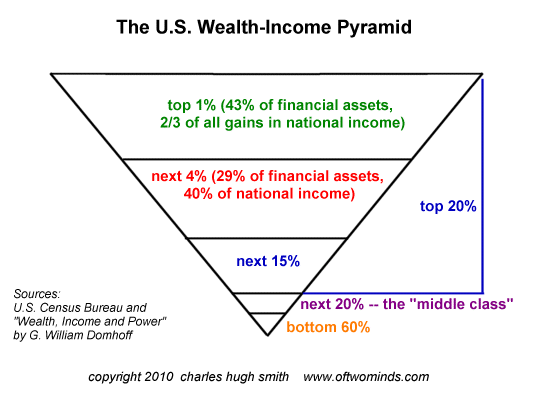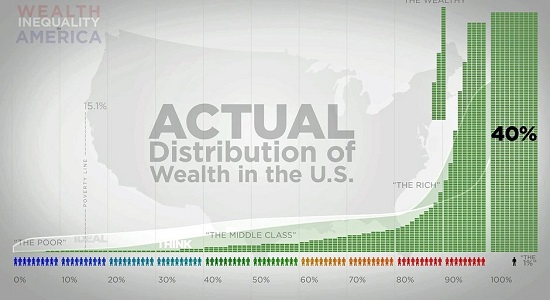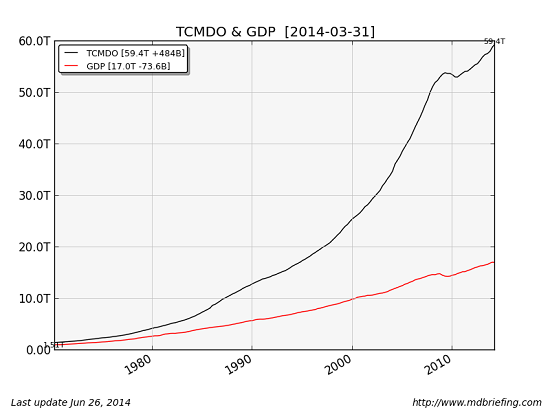The Fed's Failure Complicates Its Endgame
To demonstrate it hasn't failed, the Fed must taper/withdraw its monetary heroin.
That the Federal Reserve's policies have failed is now so painfully evident that even the political class is awakening to this truth. Rather than re-ignite broad-based, self-sustaining economic growth, the Fed's loose-money policies (zero-interest rate policy a.k.a. ZIRP, and quantitative easing a.k.a. QE or free money for financiers), have perversely distorted the economy and widened wealth and income inequality.
After six long years of unprecedented monetary expansion and intervention--more than enough time to have succeeded in its stated purpose of restarting the real economy-- political and financial blowback is forcing the Fed to withdraw its monetary heroin.
Unfortunately for the nation, the Fed's monetary heroin has addicted the economy to ZIRP, loose credit and free money for financiers. As a result, withdrawal will be painful, financially and politically.
The abject failure of these policies to aid Main Street while heaping wealth on Wall Street greatly complicates the Fed's endgame. Given the economy's dependence on the Fed's monetary heroin, declaring victory and beating a hasty retreat is not really an option: once the Fed stops delivery of monetary heroin, the economy will go into withdrawal, and the Fed's failure will be too obvious for even its most ardent backers to deny.
But if the Fed continues pushing its monetary heroin after six long years, its failure to energize the real economy will be equally obvious--as will the unintended consequences (blowback) of monetary heroin: malinvestment, systemic risk and a pernicious faith that the Fed will do whatever is necessary to keep the stock market lofting ever higher.
There are two basic schools of thought on the Fed's real agenda.
The mainstream view is the Fed is pursuing its stated goals of stabilizing inflation and employment. The other view is the Fed's real agenda is enriching its homies, the banking cartel, at the expense of the nation.
Since Wall Street has thrived while households and Main Street have seen earned income decline, the mainstream view is left with the unenviable task of explaining exactly how free money for financiers has helped J.Q. Citizen.
Household income has declined significantly in real terms: Five Decades of Middle Class Wages (Doug Short).
The first line of defense is the wealth effect, the notion that a rising stock market will make people feel wealthier and therefore more likely to borrow and spend money on stuff they don't need. This is of course the foundation of the U.S. economy: debt-based consumption, and it just so happens to generate gargantuan profits for lenders such as banks.
Unfortunately for the Fed apologists, only the top slice of wealthy households own enough equities to feel wealthier as stocks rise. Wealth in the U.S. is an inverted pyramid: the so-called "middle class" owns a small slice near the apex while the super-rich own the entire base:

The reality is the majority of households own a trivial amount of financial assets; the number of households with debt in collection far exceeds the number benefiting from the Fed's wealth effect, which not coincidentally has greatly enlarged the wealth of financiers and the few who own most of the financial assets.

This glaring disconnect between the Fed's publicly stated agenda and the results of its policies has created a political problem for the Fed. In the mainstream media's gauzy perception, the Fed is a god-like assembly that is above the grime of politics.
In truth, the Fed is as intrinsically political as any other branch of the Central State. The thundering gap between the Fed's stated goals and the results of its policies have, after six long years, reached the toadies and lackeys of the political class, who are now reluctantly stirring to the public demand to examine the Fed's closely played cards.
In other words, the failure of the Fed's policies has generated unwelcome political blowback. A few brave politicos have interrupted their campaign fund-raising long enough to grasp that the Fed has not just failed in some random fashion: the Fed is the problem, not the solution.
As a refresher, here is the Fed's Balance Sheet, bloated with over $3 trillion of freshly created money that was mainlined into the financial system:

Debt has skyrocketed under the guiding hand of the Fed's policies; GDP, not so much:

There is no mystery why the Fed's policies have failed. Fed policies have diverted interest income that once flowed to households to the banks, they've enabled the Federal government to borrow and squander trillions of dollars in deficit spending with no political trade-offs or consequences, and they've greatly incentivized malinvestments and risky bets.
Federal debt is borrowed from future generations. If it is squandered on consumption, it is effectively stealing from future generations, as their income will be devoted to paying interest on the trillions of dollars we have borrowed and blown propping up a bloated and ineffective Status Quo.

Perhaps most perniciously, the Fed has nurtured a belief that has now taken on a quasi-religious certainty that the Fed will never let the stock market go down. The Fed has bolstered this faith by launching a new free money for financiers program every time the stock market faltered.
As a direct result, nobody believes the Fed will actually reduce its monetary heroin or allow interest rates to normalize, i.e. rise: traders, money managers and the financial punditry are convinced that the Fed will soothe any tantrum thrown by Wall Street with another dose of monetary heroin.
This greatly complicates the Fed's endgame, because nobody will believe the Fed is serious about ending its monetary heroin until it allows the stock market to plummet off a cliff without rushing to save it with more free money for financiers.
The Fed is hoping to manage expectations and perceptions with such perfection that nobody notices the monetary heroin is no longer flowing. But this is an absurd fantasy: having addicted the stock market and the economy to monetary heroin over the past six years, how can the addict go through cold turkey withdrawal without being completely disrupted?
And in a delicious irony, should the Fed come to the rescue with another round of monetary heroin (free money for financiers), that will only demonstrate the complete and utter failure of the Fed's policies to generate sustainable growth in the real economy.
If the Fed has to rescue Wall Street yet again after six years and trillions of dollars of free money for financiers, that will prove beyond a shadow of doubt that the Fed has failed.
To demonstrate it hasn't failed, the Fed must taper/withdraw its monetary heroin.If the stock market tanks as a result, and the Fed rushes to the rescue with more free money for financiers, that will also prove the Fed has failed: if the economy and financial system is as robust as the Fed claims, why does it need to be rescued yet again after six long years of unprecedented injections of monetary heroin?
It's a double-bind with no escape. No matter what the Fed chooses to do, the failure of its policies to help households and Main Street while enriching wall Street and the banks will be revealed to all.
Get a Job, Build a Real Career and Defy a Bewildering Economy(Kindle, $9.95)(print, $20)
 Are you like me? Ever since my first summer job decades ago, I've been chasing financial security. Not win-the-lottery, Bill Gates riches (although it would be nice!), but simply a feeling of financial control. I want my financial worries to if not disappear at least be manageable and comprehensible.
Are you like me? Ever since my first summer job decades ago, I've been chasing financial security. Not win-the-lottery, Bill Gates riches (although it would be nice!), but simply a feeling of financial control. I want my financial worries to if not disappear at least be manageable and comprehensible.And like most of you, the way I've moved toward my goal has always hinged not just on having a job but a career.
You don't have to be a financial blogger to know that "having a job" and "having a career" do not mean the same thing today as they did when I first started swinging a hammer for a paycheck.
Even the basic concept "getting a job" has changed so radically that jobs--getting and keeping them, and the perceived lack of them--is the number one financial topic among friends, family and for that matter, complete strangers.
So I sat down and wrote this book: Get a Job, Build a Real Career and Defy a Bewildering Economy.
It details everything I've verified about employment and the economy, and lays out an action plan to get you employed.
I am proud of this book. It is the culmination of both my practical work experiences and my financial analysis, and it is a useful, practical, and clarifying read.
Test drive the first section and see for yourself. Kindle, $9.95 print, $20
"I want to thank you for creating your book Get a Job, Build a Real Career and Defy a Bewildering Economy. It is rare to find a person with a mind like yours, who can take a holistic systems view of things without being captured by specific perspectives or agendas. Your contribution to humanity is much appreciated."
Laura Y.
Gordon Long and I discuss The New Nature of Work: Jobs, Occupations & Careers (25 minutes, YouTube)
| Thank you, Mary L. ($5/month), for your marvelously generous subscription to this site -- I am greatly honored by your support and readership. | Thank you, Miha B. ($20), for your much-appreciated generous contribution to this site -- I am greatly honored by your support and readership. |



























